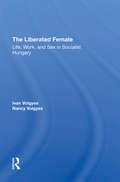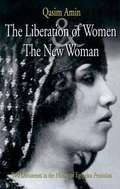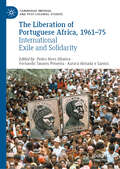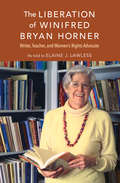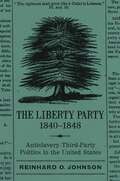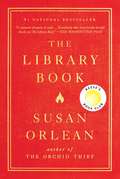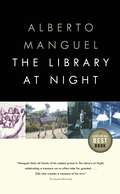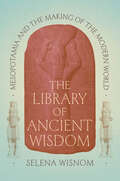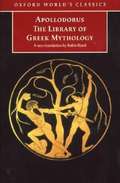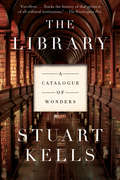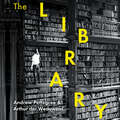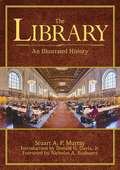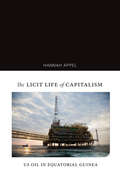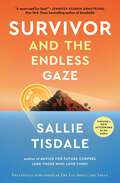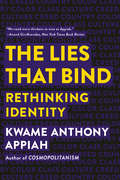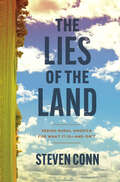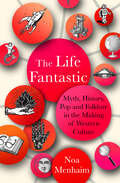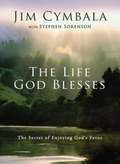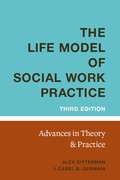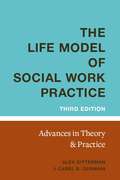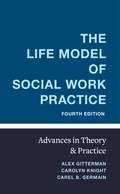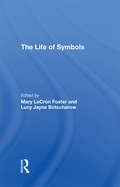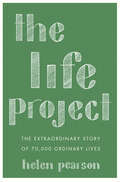- Table View
- List View
The Liberated Female
by Ivan VolgyesThis book examines the Hungarian experiment to liberate women from servitude. It provides details on the problems of Hungarian women in employment, in the household, and in the sexual relations and outlines the social policies of the government and the patriarchal culture values in society.
The Liberation Of Women And The New Woman: Two Documents In The History Of Egyptian Feminism
by Qasim AminQasim Amin (1863-1908), an Egyptian lawyer, is best known for his advocacy of women's emancipation in Egypt, through a number of works including The Liberation of Women and The New Woman. In the first of these important books in 1899, he started from the premise that the liberation of womenwas an essential prerequisite for the liberation of Egyptian society from foreign domination, and used arguments based on Islam to call for an improvement in the status of women. In doing so, he promoted the debate on women in Egypt from a side issue to a major national concern, but he alsosubjected himself to severe criticism from the khedival palace, as well as from religious leaders, journalists, and writers. In response he wrote The New Woman, published in 1900, in which he defended his position and took some of his ideas further. In The New Woman, Amin relies less on arguments based on the Quran and Sayings of the Prophet, and more openly espouses a Western model of development. Although published acentury ago, these two books continue to be a source of controversy and debate in the Arab world and remain key works for understanding the Arab feminist movement. The Liberation of Women and The New Woman appear here in English translation for the first time in one volume.
The Liberation of Portuguese Africa, 1961-75: International Exile and Solidarity (Cambridge Imperial and Post-Colonial Studies)
by Pedro Aires Oliveira Fernando Tavares Pimenta Aurora Almada e SantosThis book analyses the liberation struggles that took place in the Portuguese colonies of Angola, Mozambique, Guinea, Cabo Verde, and São Tomé e Príncipe during the second half of the twentieth century, highlighting how they unravelled and challenged colonialism in the international sphere. Activists established headquarters and training camps in various exile settings that were instrumental in their struggle for independence. Exile settings were places where the liberation movements worked with host countries, accessed representatives of foreign countries, made connections with nonstate actors and networks of support, and received political and military training. The complex networks of support formed by protestors around the globe operated on a transnational scale, using urban centres as sites of activism and arenas to promote a multiplicity of connections. Bringing together contributions from a range of skilled authors, the book explores selected hubs around the globe including those based in Kinshasa, Dar es Salaam, Cairo, Moscow, Beijing, New York, London, Paris, and São Paulo. Taking a comparative approach, this collection sheds light on the infrastructures of solidarity that were established by activists around the world, and highlights the transnational circulation of ideas around anticolonialism.
The Liberation of Winifred Bryan Horner: Writer, Teacher, and Women's Rights Advocate
by Elaine J. LawlessThis inspiring tale of grit and determination sprinkled with humor, wit, and a taste of irony is the story of Winifred Bryan Horner’s journey from a life of domesticity on the family farm after World War II to becoming an Endowed Professor. Her compelling story is one of a woman’s fight for equal rights and her ultimate success at a time when women were openly deemed "less than" men in the professional world. Winifred, a professional writer and consummate storyteller known to friends and family as Win, always assumed she would write her own memoir. But after retiring from teaching, she found that she could never find the time or inspiration to sit down and record the pivotal stories of her remarkable 92 years of life. Colleague and mentee Elaine J. Lawless devised a plan to interview Win about her life and allow her to tell stories with the intention that Win would edit the transcriptions into her memoir. Over four months, Elaine visited Win on Wednesdays to interview her about her life. Sadly, just one week after the conclusion of the final interview, Win unexpectedly passed away, before Elaine could give her the final transcripts. With the support of Win’s family, Elaine set out to finish this book on Win’s behalf.Win’s story is one that will inspire and resonate with women as they continue to work toward equality in the world.
The Libertarian Illusion: Ideology, Public Policy, and the Assault on the Common Good
by William E. HudsonThe Libertarian Illusion offers a well researched, balanced, and systematic critique of libertarian policy proposals on both the conservative (taxation and fiscal policy, health care, social security, and business regulation) and liberal (abortion, stem cell research, and euthanasia) sides of the traditional political spectrum.
The Liberty Party, 1840-1848: Antislavery Third-Party Politics in the United States (Antislavery, Abolition, and the Atlantic World)
by Reinhard O. JohnsonIn early 1840, abolitionists founded the Liberty Party as a political outlet for their antislavery beliefs. A mere eight years later, bolstered by the increasing slavery debate and growing sectional conflict, the party had grown to challenge the two mainstream political factions in many areas. In The Liberty Party, 1840--1848, Reinhard O. Johnson provides the first comprehensive history of this short-lived but important third party, detailing how it helped to bring the antislavery movement to the forefront of American politics and became the central institutional vehicle in the fight against the "peculiar institution." As the major instrument of antislavery sentiment, the Liberty organization was more than a political party and included not only eligible voters but also disfranchised African Americans and women. Most party members held evangelical beliefs, and as Johnson relates, an intense religiosity permeated most of the group's activities. At least eight U.S. senators, eighteen members of the House of Representatives, five state governors, and two justices of the Supreme Court were among the many Liberty Party members with distinguished careers in the public and private sectors. Though most early Liberty supporters came from the Whig Party, an increasing number of former Democrats joined the party as it matured. Johnson discusses the Liberty Party's founding and its national growth through the presidential election of 1844; its struggles to define itself amid serious internal disagreements over philosophy, strategy, and tactics in the ensuing years; and the reasons behind its decline and merger into the Free Soil coalition in 1848. Since most Liberty Party activities occurred at the state level, Johnson treats the history of each state party in considerable detail, demonstrating how the party developed differently state by state and illustrating how these differences blended with the national view of the party.Informative appendices include statewide results for all presidential and gubernatorial elections between 1840 and 1848, the Liberty Party's 1844 platform, and short biographies of every Liberty member mentioned in the main text of the book. Epic in scope and encyclopedic in detail, The Liberty Party, 1840--1848 will serve as an invaluable reference for anyone interested in nineteenth-century American politics.
The Library Book
by Susan OrleanA REESE WITHERSPOON x HELLO SUNSHINE BOOK CLUB PICK A WASHINGTON POST TOP 10 BOOK OF THE YEAR * A NEW YORK TIMES BESTSELLER and NEW YORK TIMES NOTABLE BOOK OF 2018 &“A constant pleasure to read…Everybody who loves books should check out The Library Book.&” —The Washington Post &“CAPTIVATING…DELIGHTFUL.&” —Christian Science Monitor * &“EXQUISITELY WRITTEN, CONSISTENTLY ENTERTAINING.&” —The New York Times * &“MESMERIZING…RIVETING.&” —Booklist (starred review) A dazzling love letter to a beloved institution—and an investigation into one of its greatest mysteries—from the bestselling author hailed as a &“national treasure&” by The Washington Post.On the morning of April 29, 1986, a fire alarm sounded in the Los Angeles Public Library. As the moments passed, the patrons and staff who had been cleared out of the building realized this was not the usual fire alarm. As one fireman recounted, &“Once that first stack got going, it was &‘Goodbye, Charlie.&’&” The fire was disastrous: it reached 2000 degrees and burned for more than seven hours. By the time it was extinguished, it had consumed four hundred thousand books and damaged seven hundred thousand more. Investigators descended on the scene, but more than thirty years later, the mystery remains: Did someone purposefully set fire to the library—and if so, who? Weaving her lifelong love of books and reading into an investigation of the fire, award-winning New Yorker reporter and New York Times bestselling author Susan Orlean delivers a mesmerizing and uniquely compelling book that manages to tell the broader story of libraries and librarians in a way that has never been done before. In The Library Book, Orlean chronicles the LAPL fire and its aftermath to showcase the larger, crucial role that libraries play in our lives; delves into the evolution of libraries across the country and around the world, from their humble beginnings as a metropolitan charitable initiative to their current status as a cornerstone of national identity; brings each department of the library to vivid life through on-the-ground reporting; studies arson and attempts to burn a copy of a book herself; reflects on her own experiences in libraries; and reexamines the case of Harry Peak, the blond-haired actor long suspected of setting fire to the LAPL more than thirty years ago. Along the way, Orlean introduces us to an unforgettable cast of characters from libraries past and present—from Mary Foy, who in 1880 at eighteen years old was named the head of the Los Angeles Public Library at a time when men still dominated the role, to Dr. C.J.K. Jones, a pastor, citrus farmer, and polymath known as &“The Human Encyclopedia&” who roamed the library dispensing information; from Charles Lummis, a wildly eccentric journalist and adventurer who was determined to make the L.A. library one of the best in the world, to the current staff, who do heroic work every day to ensure that their institution remains a vital part of the city it serves. Brimming with her signature wit, insight, compassion, and talent for deep research, The Library Book is Susan Orlean&’s thrilling journey through the stacks that reveals how these beloved institutions provide much more than just books—and why they remain an essential part of the heart, mind, and soul of our country. It is also a master journalist&’s reminder that, perhaps especially in the digital era, they are more necessary than ever.
The Library at Night
by Alberto Manguel"The starting point is a question," Alberto Manguel writes in the introduction toThe Library at Night: since few can doubt that the universe is ultimately meaningless and purposeless, why do we try to give it order? After all, our efforts are surely doomed to failure. It’s hard to think of a more profound or serious subject to start with – butThe Library at Night,Alberto Manguel says, is by no means a systematic answer. Rather, it is the story of the search for one. In the tradition ofA History of Reading, this book is an account of Manguel’s astonishment at the variety, beauty and persistence of our efforts to shape the world and our lives, most notably through something almost as old as reading itself: libraries. The result is both intimately personal and incredibly wide-ranging: it is a fascinating study of the mysteries of libraries, a thorough analysis of their history throughout the world and an esoteric, enchanting celebration of reading. It is, perhaps most of all, a book that only Alberto Manguel could have written. The Library at Nightbegins with the design and construction of Alberto Manguel’s own library at his house in western France – a process that raises puzzling questions about his past and his reading habits, as well as broader ones about the nature of categories, catalogues, architecture and identity. Exploring these themes with a deliberately unsystematic brilliance, Manguel takes us to the great Library at Alexandria, and Michelangelo’s Laurentian Library in Florence; we sit with Jorge Luis Borges in his office at the National Library in Argentina, travel with donkeys carrying books into the Colombian hinterland, and discover theFihrist, a chaotic and delightful bibliographic record of medieval Arab knowledge. There seem to be no limits to Manguel’s learning, or his ability to illuminate his investigations with magical, telling details from the past. Thematically organized and beautifully illustrated, this book considers libraries as treasure troves and architectural spaces; it looks on them as autobiographies of their owners and as statements of national identity. It examines small personal libraries and libraries that started as philanthropic ventures, and analyzes the unending promise – and defects – of virtual ones. It compares different methods of categorization (and what they imply) and libraries that have built up by chance as opposed to by conscious direction. Although it is encyclopedic (and discusses encyclopedias assembled by Diderot and fifteenth-century Chinese scholars alike) and full of concrete historical analysis (including a brief investigation of the prejudices underlying the Dewey Decimal System) this book is animated throughout by a gentle, even playful sensibility: it is governed by the browser’s logic of association and pleasure, rather than the rigid lines of scholarly theory. After all, everything in a library is connected: "As the librarians of Alexandria perhaps discovered, any single literary moment necessarily implies all others. " In part this is because this is about the libraryat night, not during the day: this book takes in what happens after the lights go out, when the world is sleeping, when books become the rightful owners of the library and the reader is the interloper. Then all daytime order is upended: one book calls to another across the shelves, and new alliances are created across time and space. And so, as well as the best design for a reading room and the makeup of Robinson Crusoe’s library, this book dwells on more "nocturnal" subjects: fictional libraries like those carried by Count Dracula and Frankenstein’s monster; shadow libraries of lost and censored books; imaginary libraries of books not yet written.
The Library of Ancient Wisdom: Mesopotamia and the Making of the Modern World
by Selena WisnomA tour of an ancient library transports us to Mesopotamia, introducing us to its people, their ideas, and their humanity. The library of Ashurbanipal, Assyria’s last great king, held an astonishing collection at the forefront of knowledge in its day, from ancient traditions in religion and literature to the latest developments in magic and medicine. When the Assyrian empire fell, the library burned to the ground, and its contents, clay tablets inscribed with cuneiform writing, lay buried for thousands of years until a team of Victorian archaeologists discovered the remnants in modern-day Iraq. The clay had baked and hardened; the very fire that consumed the library had helped its texts to survive for millennia. In The Library of Ancient Wisdom, scholar Selena Wisnom, one of only a few hundred experts able to read cuneiform script today, guides us inside this important collection and, through its contents, brings ancient Mesopotamia and its people to life. Introducing us to Ashurbanipal and his family, scribes, astrologers, physicians, and more, Wisnom explores the library’s tablets and the details they divulge about how these ancient people thought about the world. Like us, they had concerns about job security, jealous rivalries, and profound friendships, and questions about the meaning of life. Wisnom ushers us into a world where magic was commonplace, where the gods spoke to you in dreams, and where the secrets of the universe were revealed through puns—taking us to the heart of what it means to be human. Offering a close look at a major historical landmark as well as a readable account of the world’s earliest civilizations, The Library of Ancient Wisdom lays bare the ideas, hopes, fears, and desires that survive on humble clay.
The Library of Greek Mythology
by Apollodorus Robin HardThe Library of Greek Mythology is a complete summary of early Greek myth, telling the story of each of the great families of heroic mythology, and the various adventures associated with the main heroes and heroines, from Jason and Perseus to Heracles and Helen of Troy. Using the ancient system of detailed histories of the great families, it contains invaluable genealogical diagrams for maximum clarity.
The Library: A Catalogue of Wonders
by Stuart Kells""Excellent . . . Tracks the history of that greatest of all cultural institutions." —The Washington PostLibraries are much more than mere collections of volumes. The best are magical, fabled places whose fame has become part of the cultural wealth they are designed to preserve. Some still exist today; some are lost, like those of Herculaneum and Alexandria; some have been sold or dispersed; and some never existed, such as those libraries imagined by J.R.R. Tolkien, Umberto Eco, and Jorge Luis Borges, among others.Ancient libraries, grand baroque libraries, scientific libraries, memorial libraries, personal libraries, clandestine libraries: Stuart Kells tells the stories of their creators, their prizes, their secrets, and their fate. To research this book, Kells traveled around the world with his young family like modern–day “Library Tourists.” Kells discovered that all the world’s libraries are connected in beautiful and complex ways, that in the history of libraries, fascinating patterns are created and repeated over centuries. More important, he learned that stories about libraries are stories about people, containing every possible human drama.The Library is a fascinating and engaging exploration of libraries as places of beauty and wonder. It’s a celebration of books as objects, a celebration of the anthropology and physicality of books and bookish space, and an account of the human side of these hallowed spaces by a leading and passionate bibliophile.
The Library: A Fragile History
by Andrew PettegreeFamed across the known world, jealously guarded by private collectors, built up over centuries, destroyed in a single day, ornamented with gold leaf and frescoes or filled with bean bags and children's drawings - the history of the library is rich, varied and stuffed full of incident.In this, the first major history of its kind, Andrew Pettegree and Arthur der Weduwen explore the contested and dramatic history of the library, from the famous collections of the ancient world to the embattled public resources we cherish today. Along the way, they introduce us to the antiquarians and philanthropists who shaped the world's great collections, trace the rise and fall of fashions and tastes, and reveal the high crimes and misdemeanours committed in pursuit of rare and valuable manuscripts.
The Library: An Illustrated History
by Nicholas A. Basbanes Donald G. Davis Stuart A. MurrayThe Library tells the story of libraries and of the changing form and function of the book from era to era, whether clay tablets, parchment sheets, papyrus scrolls, glossy paper, recording tape or silicone chips. At the heart of the story of libraries and books is the story of the reader, who also has changed from era to era. Profusely illustrated, with fascinating is a comprehensive look at libraries that will interest book lovers and librarians.
The Licit Life of Capitalism: US Oil in Equatorial Guinea
by Hannah AppelThe Licit Life of Capitalism is both an account of a specific capitalist project—U.S. oil companies working off the shores of Equatorial Guinea—and a sweeping theorization of more general forms and processes that facilitate diverse capitalist projects around the world. Hannah Appel draws on extensive fieldwork with managers and rig workers, lawyers and bureaucrats, the expat wives of American oil executives and the Equatoguinean women who work in their homes, to turn conventional critiques of capitalism on their head, arguing that market practices do not merely exacerbate inequality; they are made by it. People and places differentially valued by gender, race, and colonial histories are the terrain on which the rules of capitalist economy are built. Appel shows how the corporate form and the contract, offshore rigs and economic theory are the assemblages of liberalism and race, expertise and gender, technology and domesticity that enable the licit life of capitalism—practices that are legally sanctioned, widely replicated, and ordinary, at the same time as they are messy, contested, and, arguably, indefensible.
The Lie About the Truck: Survivor, Reality TV, and the Endless Gaze
by Sallie TisdaleThe author of the acclaimed Advice for Future Corpses (and Those Who Love Them) brings &“her singular sensibility, her genius for language, her love of our deeply imperfect world&” (Karen Karbo, author of In Praise of Difficult Women) to this insightful exploration of reality TV and the shifting definitions of truth in America.What is the truth? In a world of fake news and rampant conspiracy theories, the nature of truth has increasingly blurry borders. In this clever and timely cultural commentary, award-winning author Sallie Tisdale tackles this issue by framing it in a familiar way—reality TV, particularly the long-running CBS show Survivor. With humor and in-depth superfan analysis, Tisdale explores the distinction between suspended disbelief and true authenticity both in how we watch shows like Survivor, and in how we perceive the world around us. With her &“bold and wise, galvanizing and grounding&” (Chloe Caldwell, author of I&’ll Tell You in Person) writing, Tisdale has created an unputdownable, thoroughly entertaining, and groundbreaking book that we will be talking about for years to come.
The Lies That Bind: Creed, Country, Color, Class, Culture
by Kwame Anthony AppiahFrom the best-selling author of Cosmopolitanism comes this revealing exploration of how the collective identities that shape our polarized world are riddled with contradiction. Who do you think you are? That’s a question bound up in another: What do you think you are? Gender. Religion. Race. Nationality. Class. Culture. Such affiliations give contours to our sense of self, and shape our polarized world. Yet the collective identities they spawn are riddled with contradictions, and cratered with falsehoods. Kwame Anthony Appiah’s The Lies That Bind is an incandescent exploration of the nature and history of the identities that define us. It challenges our assumptions about how identities work. We all know there are conflicts between identities, but Appiah shows how identities are created by conflict. Religion, he demonstrates, gains power because it isn’t primarily about belief. Our everyday notions of race are the detritus of discarded nineteenth-century science. Our cherished concept of the sovereign nation—of self-rule—is incoherent and unstable. Class systems can become entrenched by efforts to reform them. Even the very idea of Western culture is a shimmering mirage. From Anton Wilhelm Amo, the eighteenth-century African child who miraculously became an eminent European philosopher before retiring back to Africa, to Italo Svevo, the literary marvel who changed citizenship without leaving home, to Appiah’s own father, Joseph, an anticolonial firebrand who was ready to give his life for a nation that did not yet exist, Appiah interweaves keen-edged argument with vibrant narratives to expose the myths behind our collective identities. These “mistaken identities,” Appiah explains, can fuel some of our worst atrocities—from chattel slavery to genocide. And yet, he argues that social identities aren’t something we can simply do away with. They can usher in moral progress and bring significance to our lives by connecting the small scale of our daily existence with larger movements, causes, and concerns. Elaborating a bold and clarifying new theory of identity, The Lies That Bind is a ringing philosophical statement for the anxious, conflict-ridden twenty-first century. This book will transform the way we think about who—and what—“we” are.
The Lies of George W. Bush: Mastering the Politics of Deception
by David Corn"Get ready to get mad. Corn has cut through the spin and crafted an important and powerful challenge to Bush and his crew." --Molly Ivins. "David Corn's The Lies of George W. Bush is as hard-hitting an attack as has been leveled against the current president." --Los Angeles Times. "George W. Bush is a liar. He has lied large and small, directly and by omission. He has mugged the truth-not merely in honest error, but deliberately, consistently, and repeatedly." In this scathing indictment of the president and his inner circle, David Corn reveals the deceptions at the heart of the Bush presidency. With wit and style, Corn details how the Bush administration has consistently lied to the American public to advance its own interests, from mischaracterizing intelligence to whip up support for war with Iraq to misrepresenting the possible consequences of his supersized tax cut and offering false claims to push a radical agenda on crucial issues across the board. In this unflinching work of hard-hitting journalism, Corn explains how Bush has managed to get away with it and explores the danger of presidential deceit in a perilous age. This paperback edition also includes an up-to-date analysis of the aftermath of the war with Iraq.
The Lies of the Land: Seeing Rural America for What It Is—and Isn’t
by Steven ConnA "piercing, unsentimental" (New Yorker) history that boldly challenges the idea of a rural American crisis. It seems everyone has an opinion about rural America. Is it gripped in a tragic decline? Or is it on the cusp of a glorious revival? Is it the key to understanding America today? Steven Conn argues that we’re missing the real question: Is rural America even a thing? No, says Conn, who believes we see only what we want to see in the lands beyond the suburbs—fantasies about moral (or backward) communities, simpler (or repressive) living, and what it means to be authentically (or wrongheadedly) American. If we want to build a better future, Conn argues, we must accept that these visions don’t exist and never did. In The Lies of the Land, Conn shows that rural America—so often characterized as in crisis or in danger of being left behind—has actually been at the center of modern American history, shaped by the same forces as everywhere else in the country: militarization, industrialization, corporatization, and suburbanization. Examining each of these forces in turn, Conn invites us to dispense with the lies and half-truths we’ve believed about rural America and to pursue better solutions to the very real challenges shared all across our nation.
The Life Fantastic: Myth, History, Pop and Folklore in the Making of Western Culture
by Noa MenhaimExplore the sprawling network of culture to discover the incredible ways in which ideas connect to shape the world we see today.These mind-blowing essays dig down to the roots of stories, myths and literary genres, travelling from art to politics to history to folklore, and from high to popular culture and back again. Through an intricate web of sidenotes, embark on a voyage of discovery from the unluckiest book ever made to Viking horned helmets to the sex life of vampires …. or from mermaids frolicking in the margins to the ancient Amazons to the power of Amazon and on to Utopia and Atlantis … This is western culture as you&’ve never seen it before.
The Life God Blesses
by Jim Cymbala Stephen SorensonJim Cymbala points out, based on 2 Chronicles 16:9, that God is constantly searching for people to bless. God iss not looking for men and women with special talents or unusual intelligence or great strength but for those whose hearts are wholly devoted to Him. As we cultivate the kind of heart God desires to bless, we can become channels of blessing to those around us.
The Life Model of Social Work Practice: Advances in Theory and Practice
by Alex Gitterman Carel B. GermainThe book presents the "what" (theories and concepts) and the "how" (practice methods) to help people with their life stressors and, simultaneously, to influence communities, organizations, and policymakers to be more responsive to them.
The Life Model of Social Work Practice: Advances in Theory and Practice
by Alex Gitterman Carel GermainOriginally published in 1980, this seminal work was the first to introduce an ecological perspective into social work practice. The third edition expands and deepens this perspective, further developing the basic premise that, by being situated within the people:environment interface, the social work profession is distinct from other service professions. The book presents the "what" (theories and concepts) and the "how" (practice methods) to help people with their life stressors and, simultaneously, to influence communities, organizations, and policymakers to be more responsive to them.In this edition, Gitterman and Germain examine major changes to our socioeconomic and political landscape. They restore a chapter on the history of social work practice, offering a view of the limited services for African Americans provided by settlements and charity organization societies. Building on the African American self-help and mutual aid traditions, this chapter traces the replication of a parallel social service system by African American leaders for their own communities. The chapter also addresses the impact of contemporary societal trends, including the global economy, immigration, cultural changes, and the technology revolution. In addition, it discusses current professional contexts of managed mental health care, evidence-based practice, and the professional uses of technology. A new chapter explores issues and processes embedded in assessment, practice monitoring, and practice evaluation. The volume continues to feature innovative schema for assessment and intervention with respect to stressful life transitions and traumatic events, environmental pressures, and dysfunctional interpersonal processes. Practice illustrations offer reflections of today's major social issues, such as AIDS, homelessness, and modern forms of violence.
The Life Model of Social Work Practice: Advances in Theory and Practice
by Alex Gitterman Carolyn Knight Carel GermainOriginally published in 1980, The Life Model of Social Work Practice was the first textbook to introduce the ecological perspective into social work practice. This fourth edition brings the text up to date by expanding and deepening this perspective. Integrating contemporary theory and research findings with numerous case illustrations drawn from a wide range of practice contexts, this textbook provides students with an invaluable introduction to the real world of social work practice and includes knowledge, methods, and skills for advanced practice.The authors detail the theoretical foundation of the ecological perspective and the life model’s emphasis on evidence- and ethics-guided practice, culturally competent and diversity-sensitive practice, and the multiple sources of accountability that social workers face. The text features an extensive discussion of the principles of trauma-informed practice and their implications for social work practice. Its discussion of cultural competence and sensitivity to diversity incorporates contemporary concepts such as cultural humility and privilege, intersectionality, and critical race theory and presents their application to practice. The authors integrate current research throughout the text and provide numerous research applications to underscore and model the importance of evidence-guided practice.The fourth edition reflects the National Association of Social Workers Code of Ethics and the Council on Social Work Education’s most recent set of competency standards, which accredit social work schools and programs. It is accompanied by a teachers guide that provides chapter summaries, recommended teaching methods and skills, questions for discussion, and suggested assignments and identifies where in the text the nine EPAS competencies and their associated practice behaviors are addressed.
The Life Of Symbols
by Mary Lecron Foster Lucy BotscharowThis volume considers the role of analogy in symbol formation, with reference to bodily process. It focuses on symbols and symbolic structures that can be traced over millenia and across geographical distance and addresses the beginnings of figurative art in the Upper Paleolithic cave paintings.
The Life Project: The Extraordinary Story of 70,000 Ordinary Lives
by Helen PearsonOn March 3, 1946, a survey began that is, today, the longest-running study of human development in the world, growing to encompass six generations of children, 150,000 people, and some of the best-studied people on the planed. The simple act of observing human life has changed the way we are born, schooled, parent and die, irrevocably altering our understanding of inequality and health. This is the tale of these studies, the scientists who created them, sustained them, and perhaps most importantly, the remarkable discoveries that have come from them. The envy of scientists around the world, The Life Project is one of Britain's best-kept secrets.
